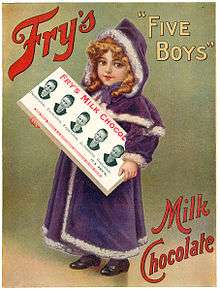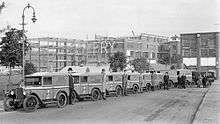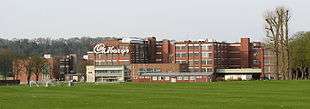J. S. Fry & Sons
| Industry | Confectionery |
|---|---|
| Fate | Merged with Cadbury Brothers in 1919. Loss of operational independence in 1967. Original factory closed 2011. |
| Founded | 1761 |
| Parent | Mondelez International |
J. S. Fry & Sons, Ltd. was a British chocolate company owned by Joseph Storrs Fry and his family. The business went through several changes of name and ownership; it was named J. S. Fry & Sons in 1822. In 1847, Fry's produced the first modern day chocolate bar.[1] The company became a division of Cadbury in the early 20th century. The original Somerdale Factory, then part of Cadbury's, was closed after the 2010 takeover of Cadbury's by Kraft Foods, now Mondelez International.
History

Joseph Fry, a Quaker, was born in 1728. He started making chocolate around 1759. In 1761 Joseph Fry and John Vaughan purchased a small shop from an apothecary, Walter Churchman, and with it the patent for a chocolate refining process.[2] The company was then named Fry, Vaughan & Co.. In 1777 their chocolate works moved from Newgate Street to Union Street, Bristol. Joseph Fry died in 1787 and the company was renamed Anna Fry & Son. In 1795 Joseph Storrs Fry assumed control of the company. He patented a method of grinding cocoa beans using a Watt steam engine. As a result, factory techniques were introduced into the cocoa business. In 1803 Anna Fry died and Joseph Storrs Fry partnered with a Dr. Hunt. The business was renamed Fry & Hunt. In 1822 Hunt retired and Joseph Storrs Fry took on his sons Joseph, Francis and Richard as partners: the firm was renamed J. S. Fry & Sons. The company became the largest commercial producer of chocolate in Britain. In 1835 Joseph Storrs Fry died and his sons took full control.
In 1847, the Fry's chocolate factory, located in Union Street, Bristol, moulded a chocolate bar suitable for large-scale production.[1] The firm began producing the Fry's Chocolate Cream bar in 1866.[3] Over 220 products were introduced in the following decades, including production of the first chocolate Easter egg in UK in 1873 and the Fry's Turkish Delight (or Fry's Turkish bar) in 1914. In 1896 the firm became a registered private company. It was run by the Fry family, with Joseph Storrs Fry II, grandson of the first Joseph Storrs Fry, as the chairman.
An employee of Fry's, H.J Packer, in 1881 established his own chocolate business in Bristol. At its eventual home in Greenbank, Bristol, Packer's Chocolate continued to provide local competition for Fry's until 2006, under various owners and brands, from Bonds through to Famous Names and Elizabeth Shaw.[4]

Near the start of World War I the company was one of the largest employers in Bristol. Joseph Storrs Fry II died in 1913. By 1919 the company merged with Cadbury's chocolate and the joint company named British Cocoa and Chocolate Company. Under Egbert Cadbury the Fry's division began the move to Somerdale, Keynsham in 1923. After 1981 the name Fry's was no longer in use at Somerdale, but the factory was still a major producer of Cadbury's products.

On 3 October 2007, Cadbury announced plans to close the Somerdale plant, the historic home of the Fry's Factory, by 2010 with the loss of some 500 jobs. In an effort to maintain competitiveness in a global marketplace, production was to be moved to a new factory in Poland. Another motivational factor was the high value of the land. Labour MP for Wansdyke, Dan Norris, said, "News of the factory's closure is a hard and heavy blow, not just to the workforce, but to the Keynsham community as a whole".[5]
In February 2010, following the takeover of Cadbury plc by Kraft Foods, the closure was, controversially confirmed to take place in 2011; Kraft had specifically agreed during the takeover battle to keep the site open. There was widespread outrage in the press and later a House of Commons Select Committee investigation into the affair.[6]
Archives
Records relating to both the business and the family are held at Bristol Archives (Ref. 38538) (online catalogue) Some records concerning the role of J.S. Fry & Sons within Cadbury are held with the Mondelez International repository at Cadbury’s UK headquarters in Bournville.[7]
Popular culture
On the BBC television program Being Human, an old Fry's Cocoa billboard hangs prominently on the side of the B&B where the main characters reside in Series 3-5. The billboard is a nod to the show's original Bristol location.[8]
See also
References
- 1 2 "The Oxford Companion to Sugar and Sweets". p. 157. Oxford University Press, 2015
- ↑ "Desert Island Doc, A Charter for Chocolate". Retrieved 7 June 2016.
- ↑ The first ever chocolate bar suitable for widespread consumption having been created by J. S. Fry & Sons in 1847, in Union Street, Bristol, England. "Sweet sweets nostalgia". BBC News. 2008-05-28. Retrieved 2008-05-30.
- ↑ "Greenbank Factory History" (PDF). John Penny.
- ↑ "Cadbury factories shed 700 jobs". BBC News. 3 October 2007. Retrieved 2007-10-03.
- ↑ "Cadbury's Bristol plant to close by 2011". BBC News. 9 February 2010. Retrieved 2010-04-19.
- ↑ "National Archives Discovery Catalogue, records page". Retrieved 5 August 2016.
- ↑ "BBC Three's Being Human moves from Bristol to Wales". BBC News. 29 January 2010.
External links
- "History of Chocolate". Cadbury's. Archived from the original on November 24, 2005. Retrieved December 1, 2005.